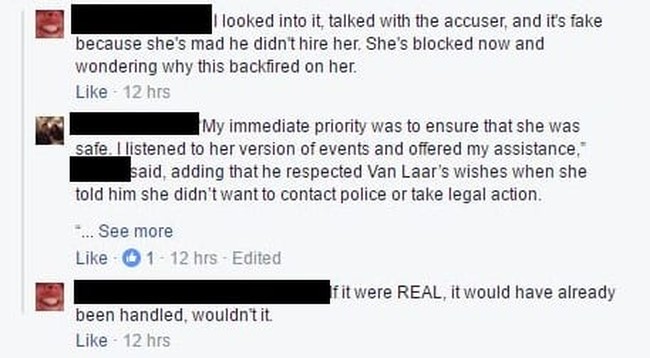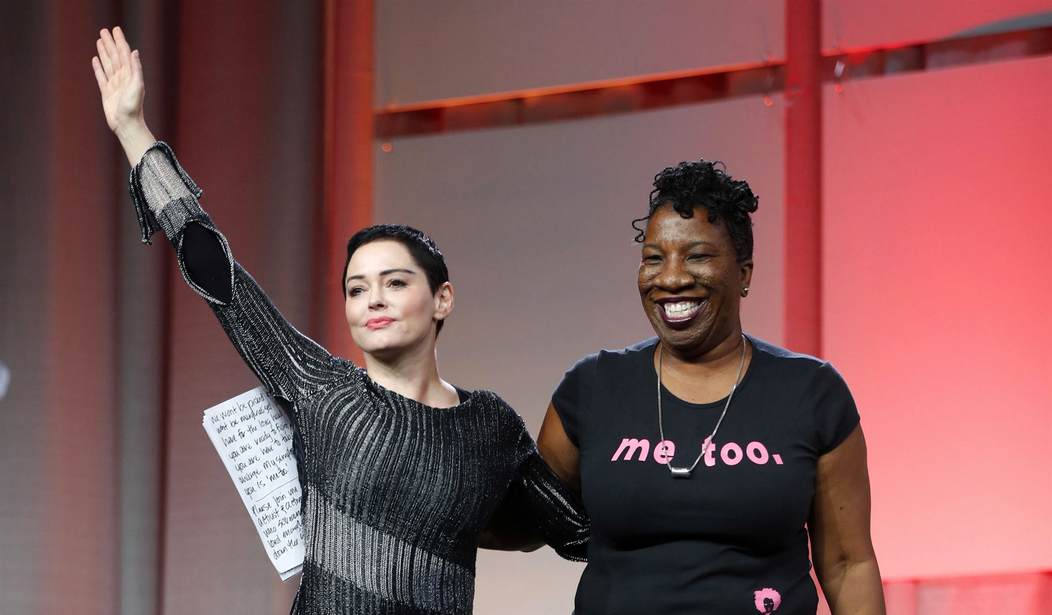“She should have said something. This happened how many years ago? Think of how many victims would not have had to suffer if these people had just spoken up!”
So goes the script of righteous indignation aimed at the women who were sexually harassed by Harvey Weinstein and stayed quiet.
Actually, plenty of women said something over the years. The New York Times wouldn’t have been able to expose harassment lawsuit settlements had women not said anything. Some men said things as well – to Weinstein himself. Other women, seeing what happened to the women who said something or who didn’t “play ball,” kept quiet.
“But — but — but still! We have laws in place to keep them from being retaliated against. If they came forward, they’d be protected!”
No, they wouldn’t. They’d be shamed and retaliated against. And if the victim were a Republican woman making accusations against a Republican man, the retaliation and shaming would be particularly harsh.
In an earlier piece this week about the conservative response to #MeToo, I referenced my own experience with speaking up about sexual harassment and the retaliation to which I was subjected. Inspired by Amy Swearer’s piece, I am sharing more of the story here. I am not naming names in this piece for a few reasons, one being that the people who know, know.
A few years back, as my first paid political gig, I worked on an underdog campaign – and we won big. Over the course of the campaign, I worked quite a bit with a local elected official, whom I’ll call Jim, who was volunteering. To make a very long story short, he propositioned me under the guise of meeting with me about his next political campaign. I laughed it off politely, saying that I don’t mix business and pleasure. I still chatted with him about politics, but ended the meeting as quickly as possible and called one of my then-best friends – who was also in local GOP leadership – and told her about his advances.
I stayed in professional contact with Jim, despite feeling uncomfortable, because I figured interactions like that were just part of being a woman working in politics and because, as a Republican in California, there is not a lot of political work. I couldn’t afford to burn that bridge.
Over the next 15 months or so, we were in intermittent contact, either at political events or texting when either of us had news about seats that might open up for an upcoming election. He didn’t proposition me again, but when I saw him at events he’d make inappropriate comments about my appearance or how my dress fit, and look me up and down.
At one event, after I was pulled away from a conversation by a client, he watched me walk away and asked my male colleague, “Are you hitting that?” When the colleague, shocked, replied in the negative, Jim said, “I don’t see how you can be around that all day without wanting to just… mmm” (implying sex).
Eventually, Jim ran for higher office, in a four-way race where I was working with one of his competitors. A few weeks before the primary I was informed that people on the Democrat side had heard Jim make sexual comments about me and other women and they were ready to go to the press about the issue.
Knowing that two politicians I considered friends had endorsed him, I decided to warn my friends so they could protect themselves and the party.
I called the wife of one. She was also a friend and was involved in community nonprofit work with me. It was extremely difficult, but I shared my experience with her. She empathized with what had happened to me and said she hated that I had to put up with that but told me I should not say anything to anyone, ever, because it would hurt the politician’s wife. She said that this should be handled within the party, then angrily told me I should have said something sooner so it could be “handled.”
I told her I would try to quash the story and I’d get back to her, but I was taken aback by her attitude.
I contacted the other elected official – the one whose winning campaign I’d worked on – directly. He was shocked, saddened, and extremely supportive, and wished I had told him earlier. He asked what he could do to help make things right. I told him that I didn’t need him to do anything because I wasn’t a victim, that I just wanted him to know what happened because I didn’t want someone else’s transgressions to reflect poorly on him.
I did what I could to get the story quashed, then sent my friend an email reiterating what I’d relayed to her and added my fear that Jim would continue this behavior throughout his political career and that he could do great damage to our party. I cc’d her husband and my other friend, who were the two highest ranking GOP officials in our area, saying, “I’ve now informed the party leadership.”
The story didn’t come out in the primary and we all moved on with our lives.
Fast forward five months. Jim and the Democrat candidate were two weeks out from the general election, and my email was made public. I said nothing to the press and, at first, Jim didn’t either. Days later, bolstered by a few of his “consultants” and minions, Jim went on a scorched-earth offensive against me to the LA Times, local television, Politico, local newspapers, and social media.
He held a press conference claiming I “aggressively pursued” him, portraying business text messages sent to him as some kind of obsession. He claimed I was a scorned woman – because he “didn’t hire me” for that campaign. (I wasn’t – I was already working with another candidate when Jim filed his candidate papers.)
He claimed he was the victim of “dirty politics” and shamed me – that my claim was “disgusting and hurtful” to him (HIM!), to his family, and to every woman “who is actually dealing with sexual harassment.”
Instead of dealing with the incident where he propositioned me – which the statement from his campaign does not deny – he produced an incomplete record of our text messages and claimed this vindicated him and challenged me to produce contrary information or shut up, basically.
He had his wife send out a mailer to the whole district saying the allegations were false and that “the text messages don’t exist.”
The woman who had been one of my best friends at the time of the indecent proposal – the one I relayed the incident to as soon as it happened – was now one of Jim’s campaign consultants. She went out in the community calling me a liar and opportunist.
My other “friend” told the LA Times she’d never believed me, that it “didn’t ring right,” but it made her sick to her stomach, and she thought it was “politically motivated.”
Her husband said he felt it was “inappropriate” that he was included on the email, though his wife said “party officials” should handle it. He didn’t stop there – he denied even knowing me. This is a man who a month before would cross a crowded room at an event just to say hello to me.
People I’d worked with in local GOP politics who wanted to be more involved in the machine went after me and my associates on Facebook. I’ll just share two:

Part of the message:
“Remember that time you framed a remarkable candidate via BS sexual harassment for political gain? I do…and I’m disgusted. I hope your career tanks, you lose all your friends, and whatever man considers you trustworthy takes a second look into your eyes.”
This guy even lied about talking to me about it.

I wasn’t the only one targeted. In the weeks leading up to the election, my close friends or business associates were also threatened and intimidated. I am sure I don’t know the full extent, but here’s a sampling:
- One colleague was called by a party boss and told if they don’t disavow me and give a statement calling me a liar, that they would lose their job.
- Another was the target of an anonymous report to DSS claiming that their children were being molested.
- Another colleague, who was facing an accusation of their own (which has since been disproven and dismissed) was contacted by reporters and when they refused to talk about my situation the reporter intimated they’d be doing a story about them instead.
The only thing I said directly to the press was that I stood by my story and was disappointed in Jim.
I sought legal advice since my character was being maligned in all manner of outlets, and those advisers wanted me to do a televised Allred-style press conference. Anyone who knows me knows that I detest the “victim” culture and am not a fan of third wave feminism – but I considered doing the press conference. I eventually decided against it, partly because I am not one to do a weepy press conference, and partly because the constant attacks, constant calls from reporters wanting me to talk, had worn me down. I hadn’t slept more than two hours at a time for weeks. I was constantly emotional, unable to eat, and missing work to deal with the barrage. By then, I just wanted to be out of the spotlight.
To protect my reputation I filed a defamation suit against Jim and others, which I withdrew a few months later when my dad was diagnosed with advanced leukemia. I focused on being with my family. But while this case was pending, Jim’s intimidation didn’t stop. Just after his swearing-in, I started getting Instagram notifications that his new official account was following me or that he had “liked” my pictures. It was a not-so-subtle, “I’ve still got my eye on you.”
My dad has since passed away and I am grateful I got to spend those last months with him and move on from the hell Jim and his associates put me and my family through. Only because of the Weinstein scandal and #MeToo (and seeing my “friend,” the politician’s wife, post a simple #MeToo on her Facebook page) have I decided to tell my story. People are calling for people like me to “name names.” I’m not naming names in this piece because I am still afraid that they’ll resume the scorched-earth campaign against me and others.
It’s important for people who haven’t dealt with this type of behavior, or who think it’s easy for people who have been subjected to it to speak up, to realize that speaking up is just the beginning. Retaliation is swift and harsh from men in positions of power and prevents others from coming forward.
This has to end. Enough.















Join the conversation as a VIP Member